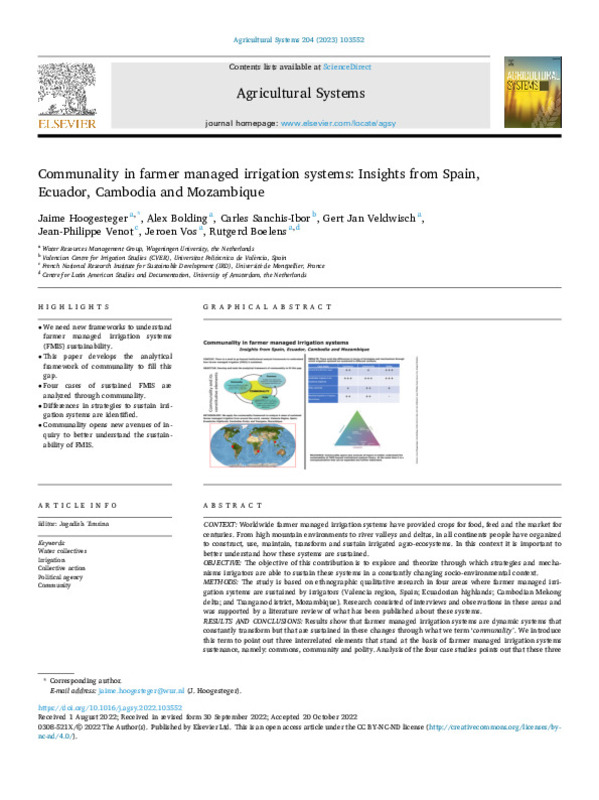JavaScript is disabled for your browser. Some features of this site may not work without it.
Buscar en RiuNet
Listar
Mi cuenta
Estadísticas
Ayuda RiuNet
Admin. UPV
Communality in farmer managed irrigation systems: Insights from Spain, Ecuador, Cambodia and Mozambique
Mostrar el registro sencillo del ítem
Ficheros en el ítem
| dc.contributor.author | Hoogesteger, Jaime
|
es_ES |
| dc.contributor.author | Bolding, Alex
|
es_ES |
| dc.contributor.author | Sanchis Ibor, Carles
|
es_ES |
| dc.contributor.author | Veldwisch, Gert Jan
|
es_ES |
| dc.contributor.author | Venot, Jean-Philippe
|
es_ES |
| dc.contributor.author | Vos, Jeroen
|
es_ES |
| dc.contributor.author | Boelens, Rutgerd
|
es_ES |
| dc.date.accessioned | 2023-04-05T18:00:44Z | |
| dc.date.available | 2023-04-05T18:00:44Z | |
| dc.date.issued | 2023-01 | es_ES |
| dc.identifier.issn | 0308-521X | es_ES |
| dc.identifier.uri | http://hdl.handle.net/10251/192717 | |
| dc.description.abstract | [EN] CONTEXT: Worldwide farmer managed irrigation systems have provided crops for food, feed and the market for centuries. From high mountain environments to river valleys and deltas, in all continents people have organized to construct, use, maintain, transform and sustain irrigated agro-ecosystems. In this context it is important to better understand how these systems are sustained.OBJECTIVE: The objective of this contribution is to explore and theorize through which strategies and mecha-nisms irrigators are able to sustain these systems in a constantly changing socio-environmental context.METHODS: The study is based on ethnographic qualitative research in four areas where farmer managed irri-gation systems are sustained by irrigators (Valencia region, Spain; Ecuadorian highlands; Cambodian Mekong delta; and Tsangano district, Mozambique). Research consisted of interviews and observations in these areas and was supported by a literature review of what has been published about these systems.RESULTS AND CONCLUSIONS: Results show that farmer managed irrigation systems are dynamic systems that constantly transform but that are sustained in these changes through what we term 'communality'. We introduce this term to point out three interrelated elements that stand at the basis of farmer managed irrigation systems sustenance, namely: commons, community and polity. Analysis of the four case studies points out that these three elements are mobilized differently by farmers depending on their socio-environmental context. We show that the mobilization of these different elements amidst internal and external challenges and conflicts, forms the basis for the longevity and sustainability of collectively managed irrigation systems.SIGNIFICANCE: In the literature on farmer managed irrigation systems collective action has been portrayed as the main pillar that sustains these systems. This contribution challenges this notion by showing that irrigation systems are sustained by a combination of individual actions, collective practices, normative frameworks and organizational forms; a sense of community; and the development of political agency (polity). Recognizing that these elements come together as site specific hybrids opens new avenues of inquiry to better understand the sustainability of farmer managed irrigation systems. | es_ES |
| dc.language | Inglés | es_ES |
| dc.publisher | Elsevier | es_ES |
| dc.relation.ispartof | Agricultural Systems | es_ES |
| dc.rights | Reconocimiento - No comercial - Sin obra derivada (by-nc-nd) | es_ES |
| dc.subject | Water collectives | es_ES |
| dc.subject | Irrigation | es_ES |
| dc.subject | Collective action | es_ES |
| dc.subject | Political agency | es_ES |
| dc.subject | Community | es_ES |
| dc.title | Communality in farmer managed irrigation systems: Insights from Spain, Ecuador, Cambodia and Mozambique | es_ES |
| dc.type | Artículo | es_ES |
| dc.identifier.doi | 10.1016/j.agsy.2022.103552 | es_ES |
| dc.rights.accessRights | Abierto | es_ES |
| dc.description.bibliographicCitation | Hoogesteger, J.; Bolding, A.; Sanchis Ibor, C.; Veldwisch, GJ.; Venot, J.; Vos, J.; Boelens, R. (2023). Communality in farmer managed irrigation systems: Insights from Spain, Ecuador, Cambodia and Mozambique. Agricultural Systems. 204:1-10. https://doi.org/10.1016/j.agsy.2022.103552 | es_ES |
| dc.description.accrualMethod | S | es_ES |
| dc.relation.publisherversion | https://doi.org/10.1016/j.agsy.2022.103552 | es_ES |
| dc.description.upvformatpinicio | 1 | es_ES |
| dc.description.upvformatpfin | 10 | es_ES |
| dc.type.version | info:eu-repo/semantics/publishedVersion | es_ES |
| dc.description.volume | 204 | es_ES |
| dc.relation.pasarela | S\475823 | es_ES |
| dc.subject.ods | 06.- Garantizar la disponibilidad y la gestión sostenible del agua y el saneamiento para todos | es_ES |








